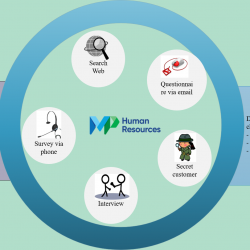
In our work, our friendship, and sometimes in the whole family, we can not avoid those who have a rather unpleasant personality. Here is how to approach each type of people, please find out MPHR:
1. You can always get angry
Behavioral characteristics: What does not meet the eyes will show the “enemy” very strong, see who, what things or things rarely have the facial sympathy and easy to hear, always caring attitude in behavior.
Their psychological need: Strong desire to prove their point of view is right and people around them have to follow their aspiration. At the same time, the type of person they “tolerate” must be confident, scheming and somewhat dictatorial.
Successful communication skills: First of all, you need to keep your mood steady, not because of the power of their embarrassment. When communicating, looking straight into their eyes will help the person less likely to agitate.
For the first few minutes, let them say the word or express their mood, and absolutely not rush to make a comment or criticism. When you start talking, speak directly to their names and repeat them many times, which will make the other person feel interested and know how to stop listening to you.
Remember, when you talk, you need to keep your temperament and attitude steady, show confidence and professionalism, not to be humble or afraid of excess, if not only cause the enemy “water to do ” never mind.
2. Negative but preferring cold water to others
Behavioral characteristics: Negative tendencies, pessimistic moods, and any suggestions of others, the first thing they think about is the obstacles and the failures. However, this is also the type of people who love to find the traces, what can also think of ways to counter.
Their Psychological Needs: Negative thinking habits largely come from the experience of failure and unhappiness in the past. They want to avoid suffering and mistakes so that behavior is always too careful, always thinking of the worst situation.
Successful communication skills: Faced with this type of person, the most miserable is to persuade them, such as “the problem will not be as bad as you think”! This only led to two incessant arguments.
Most books are to go to convince them, like “the problem will not be as bad as you think”
Do not try to prove their way of thinking is negative. What you need to do is find out their concerns and concerns. Show interest in them by sharing their sympathy for their past experiences, from which you can partially understand why they are feeling negative today.
Once you have eliminated any doubts in their hearts, this new way should give way to your thoughts. Note, even if it is difficult to persuade them to accept your proposal, do not rush. At this point you should follow their inherent negative thinking habits, take the initiative to give a bad situation to this decision, and then to address the solution.
3. Type of closed person, saving money
Behavioral characteristics: Not wanting to express their opinions, especially when you talk about their way of thinking, will often get a silent or over-the-counter response. The typical appearance of this type of person is frowning, downward looking or arms folded in front of the chest.
Their Psychological Needs: The reasons for their silence are numerous, but they are primarily related to psychological pressure, perhaps because they lack trust or are not good at talking, or this is how they suppress the news. anger or hatred as a non-verbal resistance.
Someone who speaks often speaks quietly or speaks through loudspeakers when asked to think about a problem.
Successful communication skills: What you need most is patience and time. With this type of person, urging or reminding them of limited time is just like “adding fuel to fire”.
4. Cùm ờm, love the melon
Behavioral characteristics: In addition, they are very gentle, polite but always hesitant and do not give the correct response, confirmed. Even if they do not know or have problems, they will not say it, they will not say it, they will not come back to the end, so that all exchanges and sharing are complete. futile.
Their psychological need: On the one hand, they may hope everyone enjoys and maintain good relationships, on the other hand they have too many questions, hard to think through, fear of mistakes and fear. bear the consequences.
They are hoping to be loved by so many questions, difficult to think thoroughly, afraid of mistakes and afraid to bear the consequences.
Successful communication skills: You should be the one who analyzes the problem, helping them understand what the benefits are. If you see them squeezing their lips or touching their collar, the tie indicates that they are having anxiety and pressure. At this point, you should offer more solution to clear up their anxiety.
Source: thebalancecareers.com









